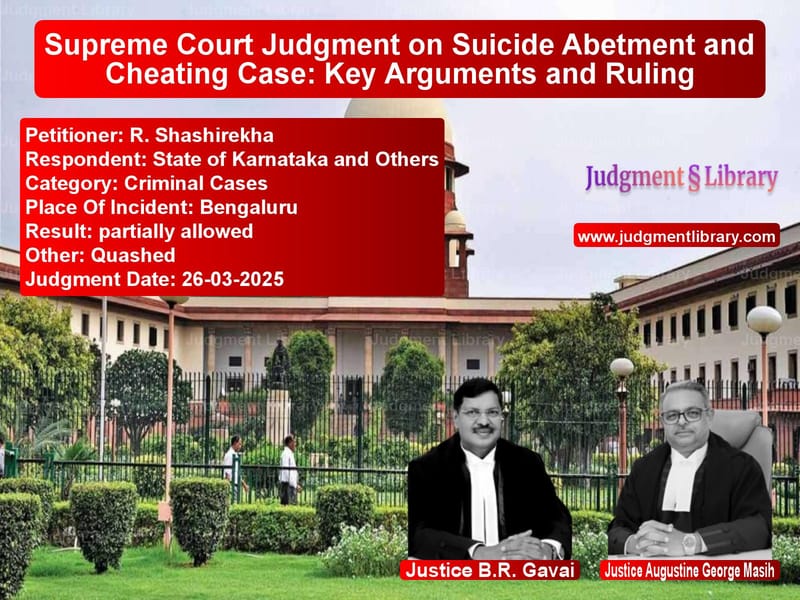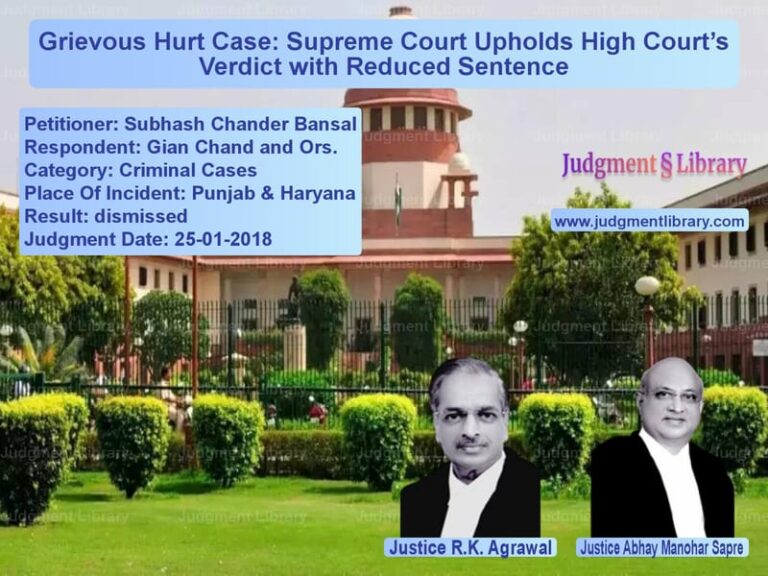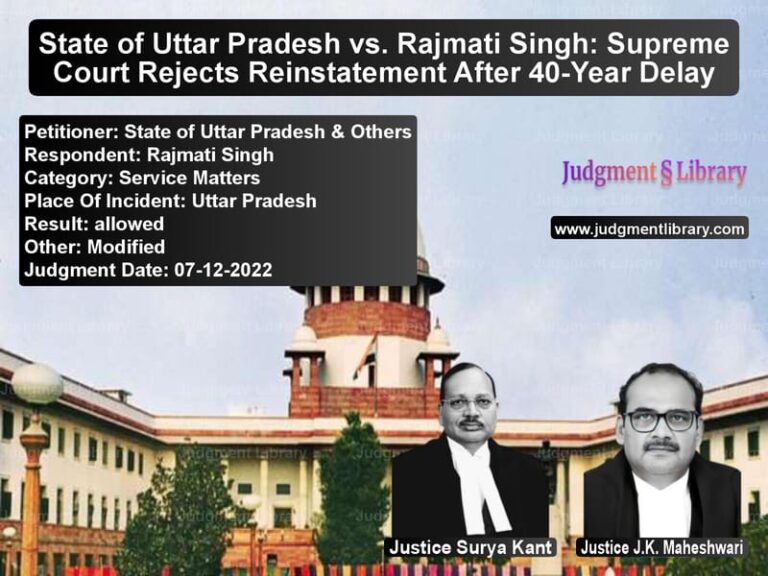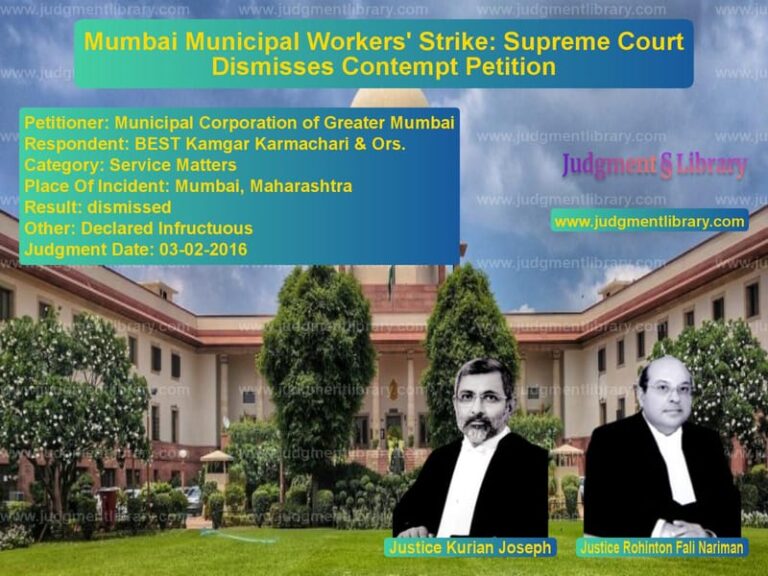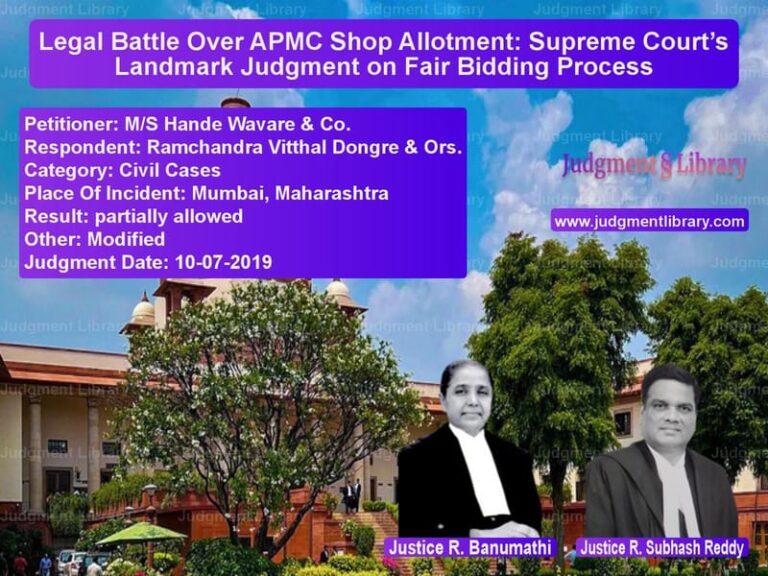Supreme Court Judgment on Suicide Abetment and Cheating Case: Key Arguments and Ruling
The Supreme Court of India recently delivered a significant judgment in the case of R. Shashirekha vs State of Karnataka and Others, addressing critical issues related to abetment of suicide and cheating under Sections 306 and 420 of the Indian Penal Code (IPC). The case stemmed from the tragic suicide of the appellant’s husband, who allegedly left behind a death note accusing his business partners of fraud and forgery. Here’s a detailed breakdown of the case, the arguments presented, and the court’s ruling.
Background of the Case
The appellant, R. Shashirekha, filed a criminal appeal challenging the High Court of Karnataka’s order quashing the FIR against respondent Nos. 2 to 4. The FIR was registered based on a death note found by the appellant, in which her husband accused his business partners of cheating him, forging his signatures, and causing him financial losses amounting to Rs. 60 crore. The note also alleged that the respondents had blackmailed him, leading to his suicide on April 14, 2024.
Key Arguments
Petitioner’s Arguments (R. Shashirekha)
- Shri Shanthkumar V. Mahale, learned Senior Counsel for the appellant, argued that the High Court erred in conducting a “mini-trial” under Section 482 of the Cr.P.C., which is beyond its jurisdiction.
- He contended that the High Court failed to provide reasons for quashing the FIR under Section 306 IPC, despite the allegations in the death note indicating abetment of suicide.
- Regarding Section 420 IPC, he highlighted that the investigating agency had seized sufficient evidence of cheating, breach of trust, and forgery by the respondents.
Respondents’ Arguments (Accused Persons)
- Shri Dama Sheshadri Naidu, learned Senior Counsel for respondent Nos. 2-4, argued that the High Court rightly quashed the FIR as the allegations did not constitute offences under Sections 306 or 420 IPC.
- He emphasized that the alleged forgery was a 5-year-old document, and there was no proximate link between the respondents’ actions and the suicide.
- He also pointed out that the appellant delayed filing the complaint for 39 days after her husband’s death, suggesting the allegations were an afterthought.
State’s Stand
- Shri D.L. Chidananda, learned counsel for the State, supported the appellant, stating that the investigating agency had found sufficient material to proceed under Sections 306 and 420 IPC.
Supreme Court’s Observations and Ruling
On Section 306 IPC (Abetment of Suicide)
The Supreme Court referred to its earlier judgment in Prakash and Others v. State of Maharashtra and Another, where it held that for abetment of suicide, there must be a “close proximity” between the instigation and the suicide. The Court noted:
“The cardinal principle of the subject-matter at hand is that there must be a close proximity between the positive act of instigation by the accused person and the commission of suicide by the victim. The close proximity should be such as to create a clear nexus between the act of instigation and the act of suicide.”
The Court observed that the alleged acts of the respondents (e.g., forging documents) were not proximate to the suicide, and the appellant’s delay in filing the complaint weakened her case. Thus, it upheld the High Court’s decision to quash proceedings under Section 306 IPC.
On Section 420 IPC (Cheating)
The Court criticized the High Court for its “casual and cursory” approach in quashing the FIR under Section 420 IPC without examining the investigation material. It held:
“If the learned Single Judge of the High Court was of the view that even investigation papers as collected by the investigating agency did not constitute an offence punishable under Section 420 of IPC, then the least that was expected of the learned Single Judge of the High Court was to give reasons as to why the material collected by the investigating agency was not sufficient.”
Read also: https://judgmentlibrary.com/supreme-court-quashes-cross-firs-between-lawyers-in-kodaikanal-dispute/
The Supreme Court set aside the High Court’s order quashing proceedings under Section 420 IPC and directed the trial court to proceed with the case. However, it clarified that the respondents could file for discharge if they believed the evidence was insufficient.
Final Order
- The appeal was partly allowed.
- The High Court’s order quashing proceedings under Section 306 IPC was upheld.
- The High Court’s order quashing proceedings under Section 420 IPC was set aside.
- The trial court was directed to proceed with the case under Section 420 IPC.
Conclusion
This judgment underscores the importance of establishing a direct link between alleged instigation and suicide for abetment cases. It also highlights the judiciary’s role in ensuring that investigations are not derailed without proper scrutiny of evidence. The ruling leaves room for further legal proceedings on the cheating allegations, ensuring justice is pursued where evidence warrants it.
Petitioner Name: R. Shashirekha.Respondent Name: State of Karnataka and Others.Judgment By: Justice B.R. Gavai, Justice Augustine George Masih.Place Of Incident: Bengaluru.Judgment Date: 26-03-2025.
Don’t miss out on the full details! Download the complete judgment in PDF format below and gain valuable insights instantly!
Download Judgment: r.-shashirekha-vs-state-of-karnataka-a-supreme-court-of-india-judgment-dated-26-03-2025.pdf
Directly Download Judgment: Directly download this Judgment
See all petitions in Suicide Cases
See all petitions in Fraud and Forgery
See all petitions in Extortion and Blackmail
See all petitions in Judgment by B R Gavai
See all petitions in Judgment by Augustine George Masih
See all petitions in partially allowed
See all petitions in Quashed
See all petitions in supreme court of India judgments March 2025
See all petitions in 2025 judgments
See all posts in Criminal Cases Category
See all allowed petitions in Criminal Cases Category
See all Dismissed petitions in Criminal Cases Category
See all partially allowed petitions in Criminal Cases Category

